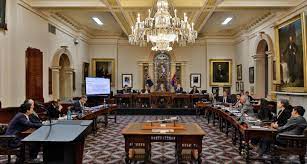POLITICS - LOCAL, NATIONAL AND INTERNATIONAL


This is also a forum for you to use. "Help Me, Ronda" welcomes contributions from others, which might include suggestions for improvements to council services and/or opinions and complaints at local, national and international level.
***
I have moved the FORUM to the top of this section, so that it's easier to find. You can have your say here. Please contribute by sending items to info@help-me-ronda.com
Background information about politics in Spain at national, regional and local level is now towards the bottom.
Forum
Ronda mayor in a spot of bother with the courts
By Paul Whitelock
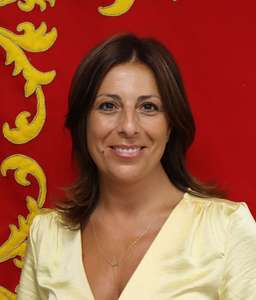
The mayor of Ronda will appear before a judge, as authorities investigate a municipal cleaning company for allegedly embezzling tens of thousands in local government money.
María de la Paz Fernández Lobato, Partido Popular (PP), was called to testify, along with six other people, including the former councillor and also former mayor, María Teresa Valdenebro Ríos, Partido Socialista de Obreros Españoles (PSOE), for alleged embezzlement through municipal cleaning company, Soliarsa.
Lobato will face questioning for her role in the company, of which she was the president of the board of directors in the years referred to in the complaint.
The Guardia Civil investigation relates to a series of suspicious 'incidents' at the company between 2017 and 2020. Among them is an alleged expense of 86,817 euros that cannot be accounted for through any receipts or documentation.
Jobs were also handed out that did not comply with the principles of equality and capacity for access to public employment, according to the court documents.
There were also allegedly salary increases paid in cash, bonuses that were not justified or controlled by anyone and an imbalance in the books due to outgoing cash payments without receipts.
The mayor was contacted for a comment on Saturday 16 September, but she declined. The town hall sent the newspaper a written response instead: "Maripaz Fernández Lobato has been called to testify as an investigated person, as will also happen with the former mayor from the PSOE party, María Teresa Valdenebro, in a procedure in which an alleged crime of embezzlement is being investigated.
"She is not accused of having intervened or participated in any specific activity, but is called to testify as a witness as president of the board of directors of the municipal cleaning company, Soliarsa, during the period under investigation.
“The court is calling the two people who were chairpersons of the board of directors. At no time is she accused of having anything to do with the circumstances reported, nor is it even indicated that she had any knowledge of them".
The spokesperson for the Socialist group in Ronda, Francisco Cañestro, said: "We demand that the mayor tell the truth about everything that is happening in this company, which has been a management disaster in recent years. We ask her to tell the people of Ronda what is happening and why she has been called to testify before the court and to be clear and forceful in her explanations."
Maripaz Fernández and her party were recently elected in the municipal elections with an increased number of seats and now enjoy an absolute majority on Ronda council.
Acknowledgements:
SUR de Malaga
Ignacio Lillo
***
Now that the local elections are done and dusted, I've removed content relating directly to that campaign.
***
Regional election round-up ahead of snap summer general election in Spain
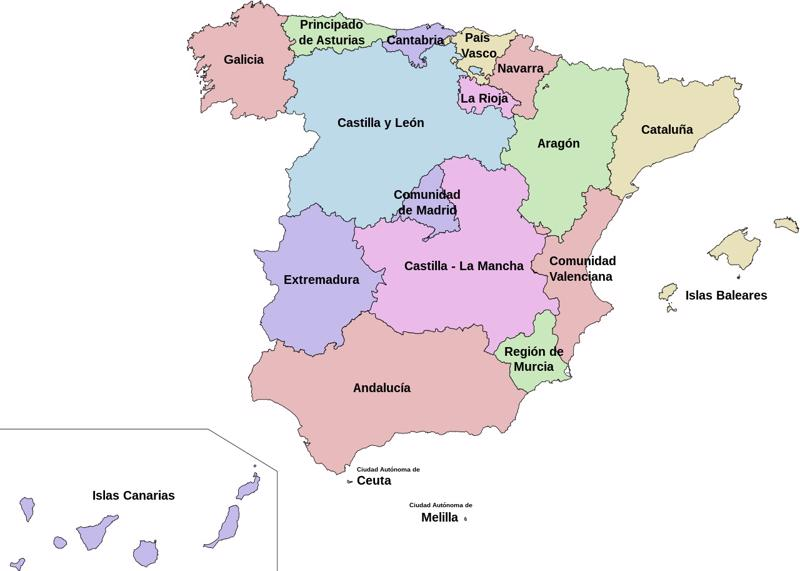
Click on the link to read a comprehensive look at the political situation in Spain today:
Regional election round-up ahead of snap summer generals (thinkspain.com)
***
SANCHEZ CALLS SNAP ELECTION FOR 23J
2 June 2023
Spanish Prime Minister Pedro Sánchez has called a snap GENERAL ELECTION for Sunday 23 July, in the hope that he can head off the shifting to the right of public opinion, demonstrated by huge support for the Partido Popular (PP) and the ultra-right-wing party VOX in last Sunday’s local elections.
The Guardian lead editorial yesterday contributed to the story.
***
Spain’s PM Pedro Sánchez calls surprise general election on 23 July
SUR in English
29 May 2023
Click on the link below to read the article:
Spain’s PM Pedro Sánchez calls surprise general election on 23 July | Sur in English
***
LOCAL ELECTION RESULTS
Last Sunday's local election results will not have pleased everybody. Nationally Spain has lurched to the right with the Partido Popular (PP) winning seats on councils throughout the land. More worryingly, the ultra right-wing party VOX doubled its number of votes compared to 2019 and has even gone into coalition with PP on some councils.
In Ronda, surprisingly, PP gained three extra councillors, and PSOE two. One of the smaller parties, Con Andalucia, won one seat. The other five parties did not win enough votes to get a councillor, despite having great campaigns.
This means that MariPaz Fernandez now has a majority of the 21 seats on the Council and will remain as mayor and will no doubt continue to promote her wasteful vanity projects, many of which show a total lack of common sense.
In several towns and villages in the Serrania, the ruling party, a local independent one, stood under the banner of PP this time, using the right-of-centre party's name as a 'flag of convenience'.
A good case in point is Montejaque, where the mayor of 12 years, Diego Sanchez, and his group switched from being members of local party ADIA to being independent PP candidates. They won five seats and PSOE two.
The outcome in nearby Benaojan was not clear. Incumbent mayor Soraya Garcia of PSOE lost a seat and no longer has a majority. They have only four of the nine places available, so she must make a deal with one of the other two parties, in order to continue in charge.
Note: For all the results throughout the area and in the whole of Spain, there is a good 'app' available free of charge. You can download it from the Apple Store or Play Store. It's called 28M -Elecciones Locales 2023.
***
A WASTE OF MONEY?
20 May 2023
By The Curmudgeon
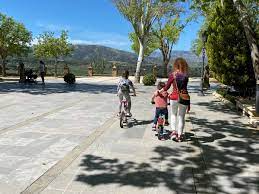
The Alameda Park re-opens (Photo: Diario Ronda)
The ruling party on Ronda Council, the Partido Popular (PP), is bragging about the re-opening this week of the Parque de la Alameda after a lengthy refurbishment.
BUT THE WORK COST A MASSIVE 1.4 MILLION EUROS! Paid for jointly by the government in Madrid and Ronda Council. The breakdown of who paid what and how much is not clear.
I can't help thinking that the money could have been better spent elsewhere. Especially with individuals and businesses struggling with the cost-of-living crisis and the aftermath of the Covid-19 pandemic.
Sure, the Alameda Park was looking a bit shabby, but a much cheaper tidy-up would have sufficed.
WASTE; WASTE and more WASTE!
The last four years have seen a number of PP vanity projects which are/were unnecessary, eg the new swimming pool near LIDL (only open three months of the year); the new bus station (the old one just needed refurbishing); the controversial car park in the Barrio San Francisco; the murals (very nice - I like them - but not necessary really in these difficult economic times).
WHERE'S THE COMMON SENSE?
It's time for a change. On 28 May at the local elections VOTE PP OUT! There are six other parties, five left-of-centre plus extreme right-wing VOX.
My choice would be either Ronda 100 x 100 or the coalition of Izquierda Unida, Podemos and Mas Pais Andalucia.
If you have the vote, please use it. Vote for COMMON SENSE and ACTION!
About The Curmudgeon
 The Curmudgeon is a miserable sod. In his 70s, he has lived in the Serrania de Ronda for a decade and a half, and is the archetypal grumpy old man. He loves a good moan, but he often has a point (or so he thinks!)
The Curmudgeon is a miserable sod. In his 70s, he has lived in the Serrania de Ronda for a decade and a half, and is the archetypal grumpy old man. He loves a good moan, but he often has a point (or so he thinks!)
***
What is Ronda Council playing at! What we need is some Common Sense.
18 February 2023
By The Curmudgeon
We all know that local councils start spending money on vanity projects in the run-up to an election. It happens everywhere, in the UK, in France, Germany, Italy and Spain. Probably also in Ukraine.
This diatribe is specific to Ronda, but I’m sure it is relevant to other places.
Ronda Council is taking the mickey, isn’t it? The Curmudgeon doesn’t usually get involved in politics, but he has looked on in horror at the huge amounts of money being ploughed into all kinds of projects in the town, by the ruling Partido Popular.
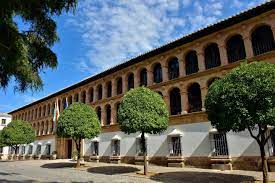
Local councils in Spain have elections this May. Ruling councils tend to invest in a range of vanity projects to try and get re-elected. Opposition parties make promises they cannot hope to fulfil.
This activity demonstrates a lack of common sense on the part of our local politicians.
Look at this list of disastrous, extremely costly and environmentally damaging projects currently in progress or recently completed in my town: photo-voltaic farms, new outdoor pool near LIDL, new bus station, huge multi-storey car park in Barrio San Francisco, demolition of existing swimming pool to create a new sports area on Avenida de Malaga, new road layout at the Recinto Ferial.
The Council trumpets its environmental credentials, with its plan to do away with paper and transfer to digital means of communication, but this is just playing at being eco-friendly.
Not a single council building sports a solar panel! Lights in council buildings are on all day whether needed or not. Fiestas and ferias continue as before with a huge waste of electricity on lighting. I could go on, but I’m getting cross ….
Back to the list of vanity projects. Where is the common sense?
100 acre photo-voltaic farms in Cuevas del Becerro are insane. Where’s the common sense?
Why build a brand-new outdoor swimming pool that is only open for three months of the year? Particularly when there was one already on Avenida de Malaga. It would surely have been cheaper to renovate that one. Common sense.
Why do we need a new bus station? The current one is well-located. It would have been far cheaper to renovate that. It’s not as if there are that many buses that come to Ronda. No common sense.
As for the monster multi-story car park being built on a greenfield site in the Barrio San Francisco, well, words fail me.
The old swimming pool at the bottom of Avenida de Malaga has been razed to the ground, in order to create a sport zone. Sorry, I thought they were planning one of those on the site of the old Mercadona store, where there is already an indoor pool, an all-weather pitch and other facilities.
The latest headline in the local paper informs us that the council is going to spend half-a-million euros on re-arranging the road system at the showground. The work will take four months. Where is the common sense?
There appears to be no joined-up thinking going on at the council. Where’s their common sense?
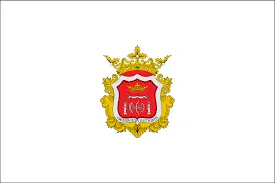
Right, my rant is over. I’ve probably missed other projects that make no sense, but I hope I’ve made my point.
I shall be exercising my right to vote in the May local elections and I hope other guiris got registered in time so that they too can have a say.
I shall be looking for an alternative to the Partido Popular, which has presided over 12 years of waste and a lack of basic common sense in the town. PSOE is a possibility, but there is a new political grouping, Ronda 100 x 100. Maybe they're worth considering.
I hope you will make your vote count. Vote for COMMON SENSE!
***
Why Can’t We Have the Vote?
Saturday, November 27, 2021
By The Curmudgeon
THE ISSUE of universal suffrage has raised its head once again, over a century after Emily Davison threw herself in front of the King’s horse at the 1913 Epsom Derby as a protest against women not having the vote in Britain.
This time, however, it’s about both men and women – men and women who live in a country other than their own.
Disenfranchised
At present in Spain, and elsewhere in the European Union, foreign residents from other EU member states are effectively disenfranchised, unless, in the case of Spain, they are empadronado, ie registered and on the electoral roll, when they may vote in local and European elections, but not in regional or national ones.
These arrangements are similar in other member states, although a few years ago the then president of France Nicolas Sarkozy was planning to give French residents of London an MP of their own, similar to residents of France’s overseas territories like Guadeloupe, Martinique, Réunion, etc.
In the light of this, Giles Tremlett, the distinguished journalist and writer, and former Madrid correspondent of the Guardian, wrote an interesting piece in that paper, proposing an MP for the Costa del Sol.
His main argument was that as a 20-year resident of Spain and a taxpayer, he does not have the right to vote in national elections in either Spain or the UK.

Tremlett wrote: “Why not allow Britons living in [other parts of] Europe to vote in the national elections of their host country? Unfortunately neither the UK nor any other country in Europe seems to want that. As a result, I live in Madrid and pay taxes to the Spanish exchequer but have no say in how my tax money is spent.
He continued: “And therein lies another problem. For not only am I prevented from voting in a Spanish general election, but, as I have lived abroad for more than 15 years, I have no right to vote in the UK either. I pay tax but cannot vote. Whatever happened to "no taxation without representation"?
Tremlett pointed out that about a million Britons live for most or all of the year in Spain. Of these, 352,000 have registered at Spanish town halls as being fully resident. Hundreds of thousands of Britons live elsewhere across the European Union.
Those who left the country in the past 15 years, the vast majority, can vote in UK elections. Most, however, do not bother. This is hardly surprising, since they must send their postal vote to the place where they last lived in Britain. People now living in Marbella, Torrevieja or Barcelona thus end up voting for candidates who are only interested in, say, the problems of Luton, Lambeth or Dumfries. That is not fair to them. What do they care, or know, about hospitals, post offices and planned ring roads a thousand miles away? It is also not fair to the people living in those constituencies.
British communities abroad have their own problems, especially post-Brexit.
Here in Spain, we worry about pensions, health care, the bureaucracy and the exorbitant price of consular services. Even the winter fuel allowance - yes, payable in some circumstances - mattered to us. [Alas, that has long since been withdrawn, cancelled by David Cameron when he was prime minister of the Conservative/Liberal Democrat coalition government.] Many of those suffering the catastrophic effects of a weak pound would like Britain to be in the euro. Many more of us have problems with local housing laws that they insist break EU rules.
Tremlett pointed out: “Britain frets about immigration but cannot be bothered to think about emigration. It should do. Of the hundreds of thousands of diaspora Britons with the right to vote, only 12,800 are registered to do so. Some 200,000 Britons move abroad every year, according to a study by the Institute for Public Policy Research. About 10% of all Britons, or 5.5 million people, live outside the country. ‘The UK government's lack of attention to its large diaspora stands in contrast to the measures being taken in other countries,’ the study noted. ‘In the UK, talk of establishing a member of parliament for the Spanish costas, a new ministry for Britons living abroad or even a special parliamentary inquiry would most likely be laughed down.’”
Following the publication of Tremlett’s article, the Guardian website was inundated with posts and the entry was closed after 118 comments.
Unfortunately many of the posts were very negative. As a British-born man who worked his entire career in the UK, but who has now, as an early retiree, decided to live in Spain, I was shocked by the many ill-informed and vitriolic comments posted there.
The “abuse” that has been hurled at Tremlett on the Guardian website for daring to raise an extremely important issue is typical of the garbage I regularly come across in English-language newspapers and on their websites down here in southern Spain.
The excellent Olive Press website has unfortunately attracted an annoying cadre of bitter and twisted know-alls who post negative comments about Spain and the Spanish at every opportunity.
The Euro Weekly News continues to feature a weekly column by Leapy Lea and letters from his Daily Mail-reading acolytes who write in to support his racist and anti-Spanish rantings.
As far as I’m concerned the volley of criticism aimed at “ex-pats” – no, we’re actually immigrants, and uninvited guests, to boot – is all about envy and small-mindedness.
Although English-born, I am a fluent Spanish and German speaker. As a result, I am blessed with three separate social lives related to each language group, all of which I find fascinating, albeit different.
Within those groups, most people, irrespective of their nationality, are mono-lingual. But I don’t think any the less of them. I happen to be a trained linguist; they are trained carpenters, electricians, police officers, sales executives, hoteliers, architects, lawyers, doctors, all skilled in their own fields. Many of them have tried to integrate and learn Spanish and are successful to varying degrees. But they are all committed to living here, are resident, registered on the padrón and, on the whole, pay their taxes here.
There are indeed stereotypical British ex-pats and I chuckled at Frank Little’s five definitions on the Guardian website thread, because I know people who fit each of the categories. Unfortunately, there wasn’t one into which I and many of my friends would fit.
A possible solution?
Nevertheless, the answer to this representation problem is quite simple and was identified by many posters on the Guardian website. If, as an EU national, you are tax resident in another EU country, you should have the right to vote in all elections, local, regional, national and European in that country, and not in the country of your birth. Simple, straightforward, no argument.
Except that policy wouldn’t help British residents from 1 January 2021 onwards, since we are no longer EU citizens. What about letting all foreign, tax-paying residents have the vote in national elections. Doesn’t that make sense?
The sooner Brussels takes note of this and changes the law to remove the current anomalies, the better. And as for those who criticise, on the grounds of envy, those of us who have legitimately moved countries within the EU, well, perhaps we should just ignore them.
About The Curmudgeon
 The Curmudgeon is a miserable sod. In his 70s, he has lived in the Serrania de Ronda for a decade and a half, and is the archetypal grumpy old man. He loves a good moan, but he often has a point (or so he thinks!)
The Curmudgeon is a miserable sod. In his 70s, he has lived in the Serrania de Ronda for a decade and a half, and is the archetypal grumpy old man. He loves a good moan, but he often has a point (or so he thinks!)
***
Introduction to the political system in Spain
Spain is classified as a democratic constitutional monarchy. This means that the ruling monarch acts as the largely ceremonial head of state.
The democratically elected prime minister, meanwhile, acts as the head of the national government.
The current political system in Spain has been in place since La Transición. This was a period in the late 1970s that saw the country transition from dictatorship to democracy under the former king, Juan Carlos I, after decades of General Francisco Franco’s military rule.
This transition involved the enactment of the Spanish constitution in 1978. This serves as the framework for the current national and regional political systems.
The current head of state is King Felipe VI., who came to the throne in 2014 following the abdication of his father, Juan Carlos.
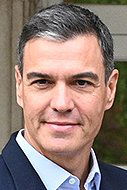 The current leader of the national government is Pedro Sánchez, head of the Spanish Socialist Workers’ Party (PSOE). He became Prime Minister in June 2018 as the head of a coalition government.
The current leader of the national government is Pedro Sánchez, head of the Spanish Socialist Workers’ Party (PSOE). He became Prime Minister in June 2018 as the head of a coalition government.
Political parties in Spain
There are a number of political parties in Spain, and many of them operate at national, regional, and local levels. Here is a brief overview of the main political parties in Spain:
- Partido Socialista Obrero Español (PSOE): Founded in 1879 and known as the Spanish Socialist Workers’ Party in English, PSOE is the oldest party currently active in Spain. It has been in government longer than any other political party in modern democratic Spain. The party has a largely progressive ideology. It is led by Pedro Sanchez.
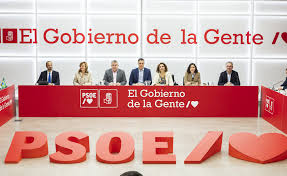
- Partido Popular (PP): Formed back in 1976 by Manuel Fraga Iribarne, a Spanish professor and politician under Franco’s dictatorship, the Popular Party (in English) has a liberal-conservative, Christian-democratic ideology. The party was in power until 2018 and is currently in opposition and led by Alberto Nuñez Feijoo.

- Unidas Podemos (UP): This alliance of smaller progressive parties was created in the run-up to the 2016 general election. These include Podemos, Izquierda Unida, and other smaller parties. The party has been in the governing coalition with PSOE since the 2020 general election. UP is currently led by Yolanda Díaz Pérez.

- Ciudadanos (Cs): Known as Citizens in English, this party came into being in Catalonia back in 2006. It is a liberal-conservative, pro-European party. Since then, Ciudadanos‘ fortunes have varied significantly. The current party president is Inés Arrimadas.
- Vox: Former members of the Partido Popular founded this anti-immigration, nationalist party in 2013. It has risen in popularity over recent elections, both on a national and regional level. Vox is led by Santiago Abascal.
Local politics in Spain
Local government in Spain operates at the municipal level, with residents electing local councillors who then choose a mayor (alcalde).
The mayor then appoints a board of governors for the local municipality. In Spain, local municipalities are responsible for the local police, traffic policy, urban planning, social services, and certain taxes.
With thanks to www.expatica.com
Politics in Andalucía
The Andalucía regional government is under the control of the Partido Popular (PP). In regional elections in 2022, the PP gained an overall majority. The president is Juanma Moreno.
Politics around the Serrania
Local elections take place on 28 May 2023. Foreigners who are resident and on the electoral roll (empadronad@) are entitled to vote in local elections.
Ronda
Voters elect a new town council every four years. Ronda council is currently made up of 21 councillors (concejales). The mayor for the last three terms (12 years) has been Maria de La Paz Fernandez Lobato, of the Partido Popular.
For the next elections, the alcaldesa will have competition for the role. Isabel Barriga, spokesperson for Ronda 100 x 100, has announced her candidature for the mayor's office, as has Francisco Cañestro from PSOE, Carlos Marisol of IRonda, Ricardo Calle from APR (Alianza por Ronda), Jose Antonio Gomez from VOX and Fran Sancho for the clumsily named Coalicion de Izquierda Unida, Podemos y Mas Pais Andalucia.
Recent headlines from the local press, Ronda Semanal:
El PP destaca la inversion en obras .....
Cañestro (PSOE) se interesa por los proyectos de Ronda
"Nosotros (Ronda 100 x 100) queremos trabajar por Ronda y poner las cosas en su sitio"
"Caminamos contigo, caminamos con Ronda" (Coalicion IU, Podemos y Mas Pais Andalucia)
The council has a Facebook page:
Excmo. Ayuntamiento de Ronda | Ronda | Facebook
Benaojan
Current alcaldesa is Soraya Garcia (PSOE). There are nine councillors.
There are three parties this time: AGRUPACIÓN PROGRESISTA DE BENAOJÁN (APB); PP; and PSOE.
Candidates for mayor are (respectively): FRANCISCO GÓMEZ GONZÁLEZ (Independiente); GUILLERMO BECERRA MONTES and ISABEL SORAYA GARCÍA MESA.
Soraya Garcia (PSOE-A) [Photo: Twitter]
Montejaque
Diego Sanchez Sanchez has been mayor of Montejaque for the last 12 years, as leader of his own party, ADIA (Agrupacion Democratica Independiente Andalucia). There are seven councillors, five are ADIA and two PSOE.
For the elections in May 2023, ADIA is switching to be PP Independiente..
The PSOE candidate for mayor is Manolo Calle.
Diego Sanchez Sanchez (PP independent)
Arriate
There are three parties competing for 11 seats on the council: PP, PSOE and SUMAMOS.
Candidates for mayor are (respectively): MARIA DEL PILAR CONDE GUERRERO; FRANCISCO JAVIER ANET RUEDA; and ALBA DELGADO RUIZ
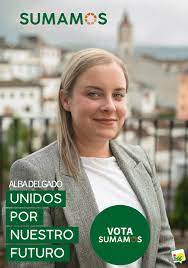 Alba Delgado Ruiz (SUMAMOS) [Photo: Facebook]
Alba Delgado Ruiz (SUMAMOS) [Photo: Facebook]
Jimera de Libar
Two parties in the running here chasing 7 seats: PP and PSOE-A
Candidates for mayor are FRANCISCO JAVIER LOBO CABALLERO (PP) and ADRIÁN PERNÍAS ARZA (PSOE-A)
Francisco Javier Lobo Caballero (PP) [Photo: El Español]
Cortes de la Frontera
incorporating Cañada del Real Tesoro (Cortes Estacion)
There are 11 council members. Among the candidates for election in 2023 are Julie Wilkinson, English, a long-time resident of the village, representing PSOE-A, and Marleen Pieper, Dutch, for PP Independiente.
 Julie Wilkinson (PSOE-A) [Photo: Julie Wilkinson]
Julie Wilkinson (PSOE-A) [Photo: Julie Wilkinson]
The candidates for mayor are: GEMA DEL ROCÍO RUIZ RODRÍGUEZ (PSOE-A); JOSE ANTONIO ZURERA GARCIA (Independiente) (PP); and JOSÉ MIGUEL BAEZA GARCÍA (VOX).
